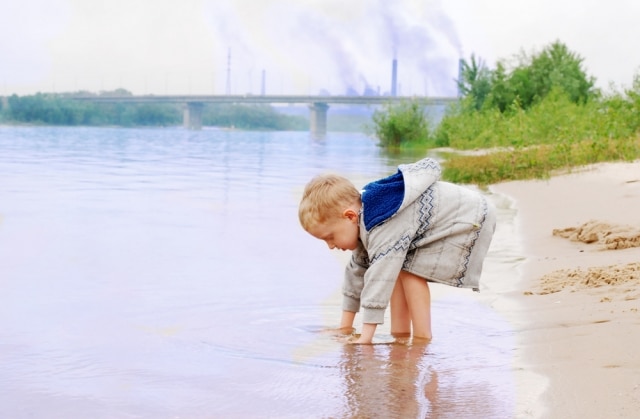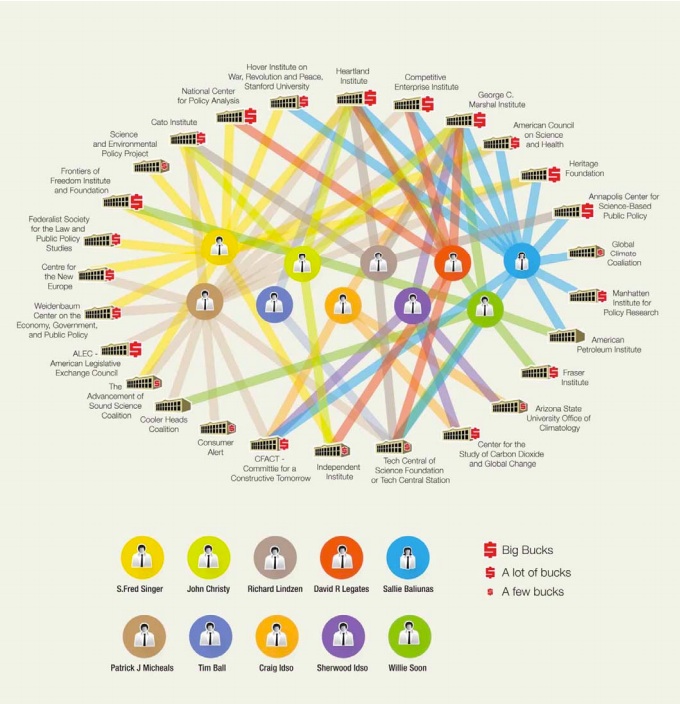As the Intergovernmental Panel on Climate Change prepares to release its Fifth Assessment Report (AR5) – the latest installment of its comprehensive assessment of climate science – early next year, the science is already under attack. As the U.S. Global Change Research Program puts the final draft of the third National Climate Assessment together, also due out in early 2014, its conclusions are already under siege.
In an updated report released today, Greenpeace explains how these attacks on the science of climate change – on the reports, on the scientists themselves, and on the rigorous scientific process itself – are part of a decades-old, well-organized, and richly-funded campaign to discredit the science of climate change and to intentionally pollute public discourse on climate change.
In Dealing in Doubt: The Climate Denial Industry and Climate Science, an update of their 2010 report, Greenpeace exhaustively describes the fossil fuel funded climate denial machine, tracing its Exxon-funded, tobacco industry-inspired roots in the 1990s to the intricate and secretive web of disinformation that exists today.
Three years ago, Jim Hoggan wrote about the first release of Dealing in Doubt here on DeSmogBlog: “The new report succinctly explains how fossil fuel interests used the tobacco industry’s playbook and an extensive arsenal of lobbyists and “experts” for hire in order to manufacture disinformation designed to confuse the public and stifle action to address climate change.”
This ExxonSecrets map helps illustrate the Dealing in Doubt section on how ExxonMobil’s money funds front groups that pay for “experts” to confuse the public on climate change.
The new edition updates that original content – the Koch Brothers, for instance, weren’t a household name in early 2010, nor was their integral involvement in climate denial then well understood – and adds new sections and case studies to the already thorough evaluation. According to the report’s introduction:
With this new edition of Dealing In Doubt we:
- detail the ongoing attempts to attack the integrity of individual climate scientists and their work.
- look beyond the strategic parallels between the tobacco industry’s campaign for “Sound Science” (where they labeled mainstream science as “junk”) to the current climate denial campaign, to new research that has come to light revealing the deeper connections: the funding, personnel and institutions between the two policy fights.
- detail how some scientists are now fighting back and taking legal action.
- showcase the Heartland Institute as an example of how tobacco-friendly free market think tanks use a wide range of tactics to wage a campaign against the climate science.
- reveal the range of tricks used by the denier campaign, from “pal review” instead of peer review, to personal attacks on scientists through Freedom of Information requests, self-publishing books, and the general conspiratorial noise from the denial machine in the blogosphere.
“Dealing in Doubt” saves its brightest spotlight for the “poster child” of the climate denial machine: the Heartland Institute. The free market think tank (they of the infamous Unabomber billboard) pays “experts” (whose actual credentials never seem to align with the climate topics they bluster about) to get in front of cameras and spew pseudoscience to willfully confuse the public. They also publish the NIPCC, an obvious affront to the IPCC‘s report, and a new edition is due out next week. But that’s just the tip of the iceberg regarding Heartland. Greenpeace’s report has a whole lot more detail.
If you’re a regular reader of DeSmogBlog, leafing through the report you’ll see a lot of familiar names, as paid shill after paid shill is exposed: Patrick Micheals, Willie Soon, Sallie Baliunas, David Legates, Fred Singer, Steve Milloy. And the list goes on.
“Dealing in Doubt” pays special attention to attacks on the IPCC and how the Fifth Assessment Report is already being twisted to confuse the public. Take this account from a section subtitlted “The Cherry Picking Begins”:
The IPCC process requires that draft versions of the report are circulated to reviewers. These are clearly unfinished work product and not meant for distribution.
In December 2012, the first of the denier leaks of the AR5 report was posted on the internet by a blogger. It was picked up by two mouthpieces of the denial machine, bloggers Anthony Watts and James Delingpole, who claimed one particular sentence was proof the IPCC had finally decided the sun was influencing global warming.
Blaming the sun is a favourite memes of denier arguments, fueled by astrophysicist Willie Soon, and one that has been thoroughly discounted. The AR5 leaked draft had itself discounted the notion, but the bloggers had cherrypicked to the extreme.
In short, the deniers leaked half a paragraph and portrayed it as a new conclusion, completely ignoring the subsequent sentence that specifically ruled out their claim.
Scientist Steve Sherwood told DeSmogBlog:
“The single sentence that this guy pulls out is simply paraphrasing an argument that has been put forward by a few controversial papers … purporting significant cosmic-ray influences on climate. Its existence in the draft is proof that we considered all peer-reviewed literature, including potentially important papers that deviate from the herd. The rest of the paragraph from which he has lifted this sentence, however, goes on to show that subsequent peer-reviewed literature has discredited the assumptions and/or methodology of those papers, and failed to find any effect.”
There have been whole books published on the climate denial industry – check out Merchants of Doubt by Naomi Oreskes and Erik Conway or Climate Cover Up by our own James Hoggan – but if you’re looking for a quick yet comprehensive primer that’s up-to-the-minute in detail, you should download “Dealing in Doubt” right away.
Image credit: child playing in river near industrial plant
Subscribe to our newsletter
Stay up to date with DeSmog news and alerts








